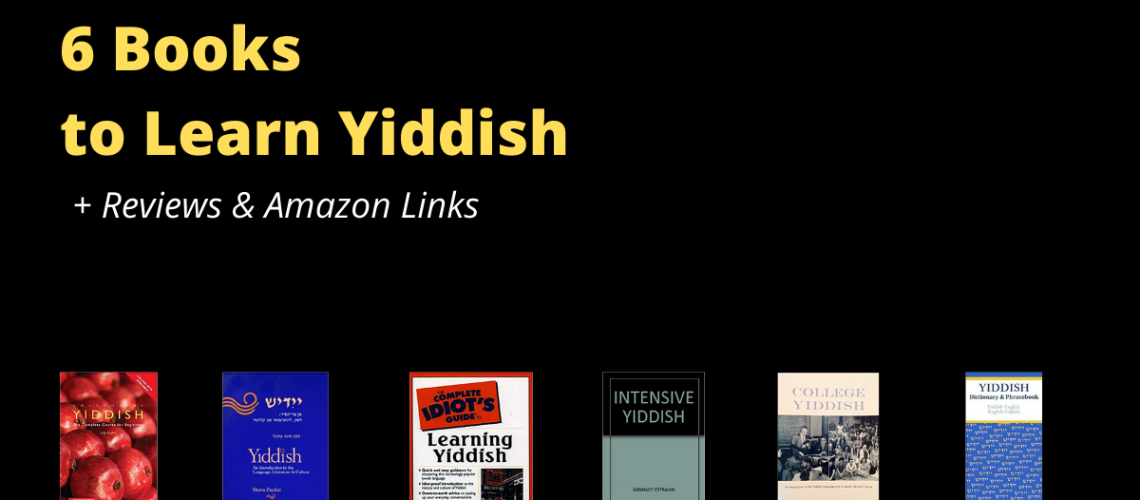Are you looking for the top books to improve your Yiddish? Well we’ve done the research find you the 6 best books to learn Yiddish in 2020. These books will help you grasp the standard or academic Yiddish variant in 4-6 weeks of moderate study. If you’re looking for how to start learning the language, check out how to learn Yiddish.
- Colloquial Yiddish by Lily Kahn
- College Yiddish by Uriel Weinreich
- Yiddish: An Introduction to the Language, Culture, and Literature Vol 1
- Yiddish Dictionary & Phrasebook
- Intensive Yiddish
- Complete Idiot’s Guide to Learning Yiddish
Colloquial Yiddish (Beginner to Intermediate)
People like this book what can I say? I think I’m a little biased though. As mentioned in our previous blog “7 best books to learn Hebrew” I always look for a book in the Colloquial series. When I started learning Yiddish, this one did not fail at all! There are roughly 15 chapters are great, and I mean great, content.
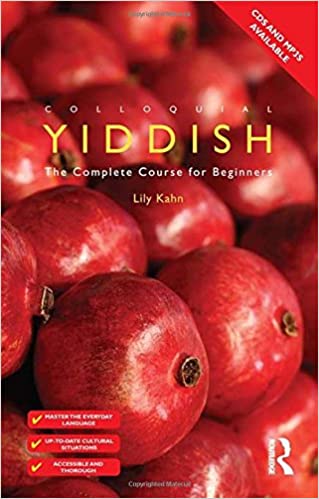
“I want to comment on the scope of the book, both in terms of grammar and vocabulary. I’m really impressed with how much vocabulary is taught in those 15 chapters. I finished this book and tried reading some articles in the Yiddish Forward (a popular Yiddish newspaper), only to find that I knew at least two-thirds, maybe more, of the words just from “Colloquial Yiddish.” Kahn chose vocabulary that is relevant and thorough, and doesn’t shy away from teaching lots of Loshn-Koydesh (Hebrew origin) words. The grammar, too, is very complete. While reading this book, I saw that Routledge had come out with an elementary grammar workbook by Rebecca Margolis, and I borrowed it from the library. Believe it or not, I found that it was actually too easy and there was nothing in it that was new to me because the grammar coverage in “Colloquial Yiddish” already covered it all.” 5 Star Amazon Review
College Yiddish (Beginner to Lower Advanced)
Another book I used back in the day was “College Yiddish” by Uriel Weinreich… The 1999 edition. I personally don’t recommend this book for passive learners, or those who are not super serious about their language study. It’s a gold mine for experienced language learners, and those who want to really dive into Yiddish. But you need to be familiar with the Hebrew alphabet in order to understand the texts
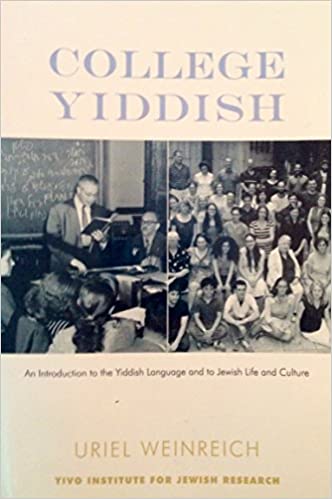
“I went through this book more than once when first learning to read Yiddish, and it was extremely helpful. Well organized, grammar is well-explained, nice exercises and interesting reading selections, especially the texts of real songs, poems and stories later on in the book. It’s great that this book is still in print, and if your main objective is reading Yiddish it may still be the best textbook available. However,although it is called the “sixth edition,” it is unchanged from the original publication (or at least from the 1960 edition). Thus, the conversations and stories from everyday life in this book will appear stilted or outdated to contemporary students; this was written long before the personal computer, email (blitspost, in Yiddish). Another small cavil is that the author, Uriel Weinreich, was one of the high priests of YIVO standard Yiddish, so there is little in this book that will expose the student to the dialects used by most native-speakers of the language, who nowadays are mainly in the ultra-orthodox/Chassidic communities. Within these limitations, it’s a fine textbook.” 4 Star Amazon Review
Yiddish: An Introduction to the Language… Vol 1 (Upper Beginner to Intermediate)
This book, again another one which I have personally used, is a great starter for someone who is somewhat familiar with how Yiddish sounds and who can mess with the Hebrew alphabet. Somewhere between an upper beginner and absolute beginner. It’s got lots of dialogues with translations and a lot of great vocabulary and grammar exercises.
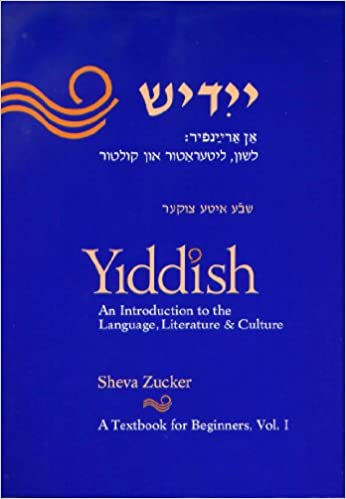
Purchase Yiddish an Introduction to the Language, Literature & Culture Vol. 1
“I bought this for a Level 1 class in Yiddish that I am taking. It starts off with the Alphabet, both block and cursive forms then jumps right in with very basic grammar and easy dialogues. It starts to get more challenging pretty fast. In addition to grammar, vocabulary and exercises the book also contains reading passages, songs, and sayings and proverbs. It is a delight to learn with this book. As others have stated, this book uses Roman letters very sparingly and only at the beginning. To learn Yiddish you need to learn the Hebrew alphabet.” 5 Star Amazon Review
Yiddish Dictionary & Phrasebook (Great for all levels!)
This phrasebook by Vera Szabo is probably the best up-to-date Yiddish phrasebook you’ll ever find. It’s got phrases like “tsi iz do a farbindung?” [Is there a connecting flight] or “vu ken men dingen an oyto?” [Where is the car rental] which to me is hilariously modern and heart warming. Yiddish is not spoken by many, and those who do still speak the language rarely see it in such modern context, which is why I absolutely love this book.
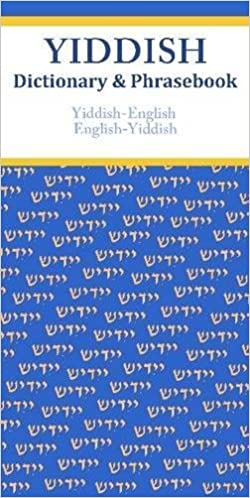
Purchase Yiddish Dictionary & Phrasebook
“I liked organization by topics to practice conversations for traveling, eating in a restaurant, getting medical care, etc.” 4 Star Amazon Review
Intensive Yiddish (Beginner to Intermediate)
This course by Gennady Estraikh is a great book for beginners who want to quickly dive into Yiddish. Be ready though, it is quite intensive. This 255 page book comes packed with rich Yiddish content, and lots and lots of dialogues. So if you want to excel your Yiddish learning, definitely grab this book!

“A remarkable and useful textbook, but not, I think, for beginners, I came to it after studying Yiddish on my own for a few years, including working my way through both volumes of Sheva Zucker’s textbook. The two volumes of that book, with its useful CDs, taught me everything I know, and made me ready for “Intensive Yiddish.” I should say that I am less than a quarter of the way through as I write this. The vocabulary of “Intensive Yiddish” from the very beginning would be impossibly daunting for a true beginner. Everything about this book shows that it was written by a real linguist and a native speaker of Soviet Yiddish, i.e., not someone who grew up in an overwhelmingly English-speaking environment. It’s contemporary in tone and emphasis, treating Yiddish as a living and evolving spoken and written language, not just a tool for access to the Jewish culture of the past. The grammar sections (drawn from Dovid Katz’s grammar, which is available free online) are particularly good, but again you must come to it already understanding what a nominative, dative and accusative are.. I don’t know if this book is used anywhere as a college classroom textbook, but having a live teacher would certainly help.” 5 Star Amazon Review
The Complete Idiot’s Guide to Learning Yiddish (Beginner)
My friend bought me this book as a joke back in highschool, and to be completely honest it kind of is a joke. Not necessarily in a bad way either. It’s actually perfect for an absolute beginner. Just not so great if you want to take Yiddish seriously. This book will definitely help you if you’re looking to take a light weight approach to the language, but certainly be a joke to you if you’re aiming for serious study. There is almost no use of the Hebrew / Yiddish alphabet, that should give you an idea as to who the target audience is.
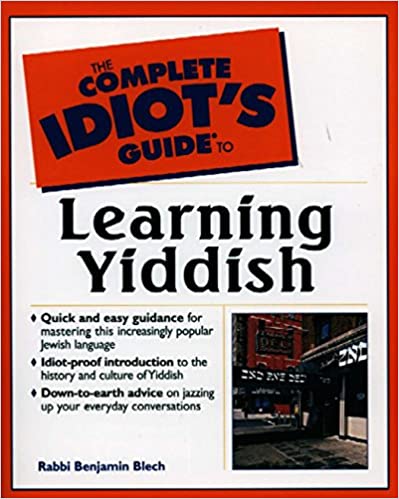
Purchase Complete Idiot’s Guide to Learning Yiddish
“A fabulous book! Wonderfully written and a real learning tool as well as entertaining. The stories and descriptions aide so much in learning the vernacular of Yiddish. Highly recommended!” 5 Star Amazon Review
